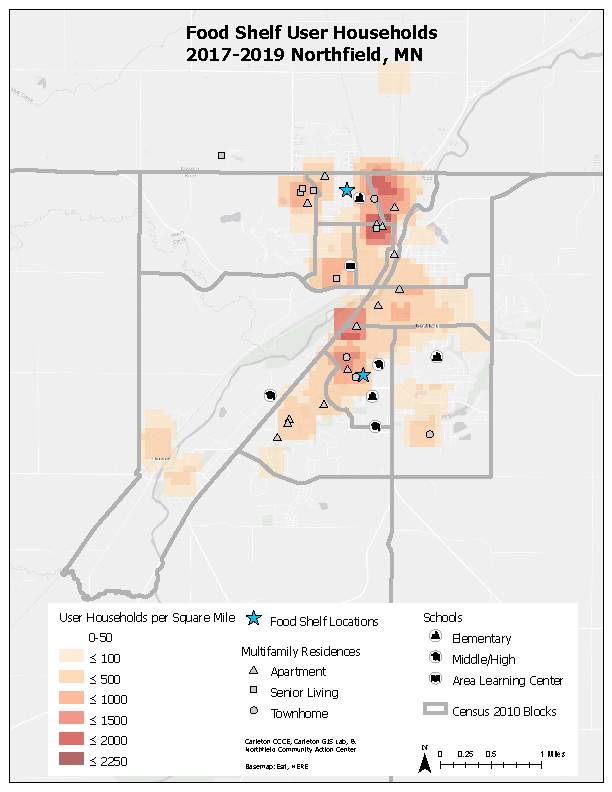When we’re at our best, community engagement at Carleton bridges disciplines, curricular and co-curricular pursuits, and communities on and off campus as we work to advance shared priorities. The trajectory of a collaboration with the Community Action Center of Northfield (CAC) has deepened over time through the dynamic interplay of ACE classes and co-curricular student leadership resulting in real world changes in food systems in Northfield.
One recent expression of that interplay surfaced in Spring 2019 with the Statistical Consulting ACE class taught by Assistant Professor of Statistics Andy Poppick. There students analyzed and condensed data to help the CAC get a picture of how clients were interacting with their housing, food, and other emergency safety net programs. The class built on the long-running relationship between Carleton and the CAC, including the student-led Food Recovery Network, which rescues potentially wasted food from Carleton, grocery stores, and farms to ensure that regardless of means, our neighbors have access to ample choice of fresh and healthy food options.

The following year, in another iteration of the same class taught by Assistant Professor of Statistics Adam Loy, students carried forward with the previous year’s work to create heat maps of Northfield that showed where clusters or concentrations of CAC service users live in Northfield. These maps revealed a stark reality: most people going to the CAC live on the other side of town — and Northfield has very limited public transportation.
Food Recovery Network program director Sarah Allaben ‘21 explains that for the CAC, the heat map “allowed for a clearer understanding of the spatial patterns of food insecurity (and other types of need) in Northfield. This information can help them tailor their future projects, including food distribution efforts and their current work constructing a satellite food shelf, to target areas of greatest need. Having an anonymized heat map can also allow the CAC to spread this information more publicly, potentially helping to attract donors or share their findings with other Northfield non-profits.”
Specifically, the CAC used the heat map to make a successful case to fund a second satellite food shelf through a grant proposal drafted by Carleton CCCE student fellows, including Gracie Little ‘21. “That was my first experience with grant writing,” says Little, “and it was amazing being part of a project with such a tangible impact.” The heat map helped the CAC select a food shelf location nearer neighbors most likely to use this resource, and the now anonymized data continues to be used in current grant applications.
“The original heatmaps were not anonymized at all,” says CCCE fellow Jaylin Lowe ‘21, who participated in the Stats Consulting class project. The maps met their goal of being helpful for CAC’s internal use, with “each household … represented by a single point, so households could be identified clearly on the map,” explains Jaren Yambing ‘22.
However, to make the most of the data, it would need to be shared publicly, and that requires anonymization. Following from this class, Food Recovery Network program directors worked with the CCCE’s Assistant Director for Community Impact Erica Zweifel to anonymize the maps for CAC’s broader public use. The work, done by Jaren in collaboration with others and help from the Carleton Geographic Information Systems (GIS) Lab, involved decreasing the map’s spatial granularity, so that individual households could not be recognized.
This is an example of the kind of integrated, purposeful, impactful collaboration we are continually striving toward, made possible by strong relationships and structures not only between the CCCE and the CAC, but also between CCCE staff, students, and programs, and ACE faculty. We’re grateful to have assisted in making connections between students’ coursework, volunteer work and professional work that has made tangible progress toward community-led change.